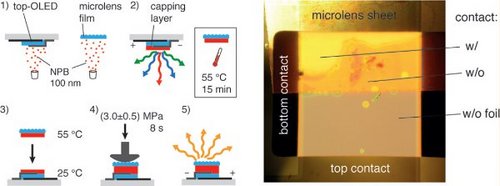Recently, Researchers from Dresden's University of Technology (TU Dresden) have made a breakthrough on a highly efficient white top-emitting OLED design that feature "outstanding" color quality, and is compatible with flexible OLEDs.
In this new design a refractive index matched microlens film was laminated to the top-emitting OLED to form direct optical contact. It has a CRI of 93, CIE coordinates of (0.472, 0.430) and an emission from 410 to 750 nm that almost spans the complete visible spectrum (380 to 780 nm). The efficiency is up to 30 lm/W.

The lamination of such an outcoupling structure should be fully roll-to-roll compatible and even allows to be used as an encapsulation film when water and oxygen barriers are added. The researchers say that top-emitting OLEDs are favorable in lighting applications as they can be processed on cheap metal substrates in roll-to-roll processes.
However in these OLEDs an optical microresonator is formed between the semitransparent top and highly reflective bottom metal electrodes, and the emission is typically spectrally narrow and has a noticeable angular dependence.
Additionally, conventional light outcoupling concepts (substrate surface modification etc.) cannot be applied to the bare organic layer stack.












